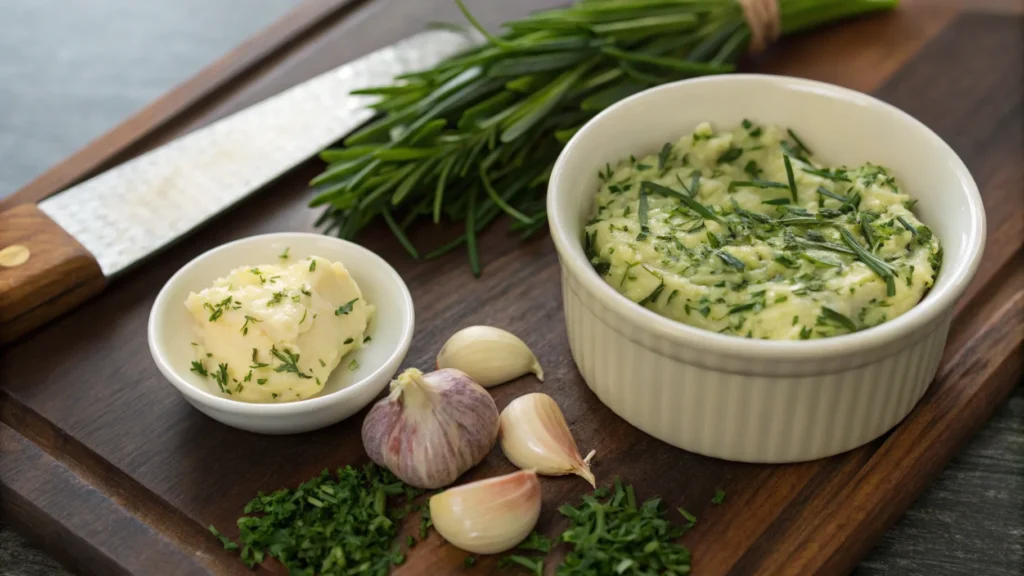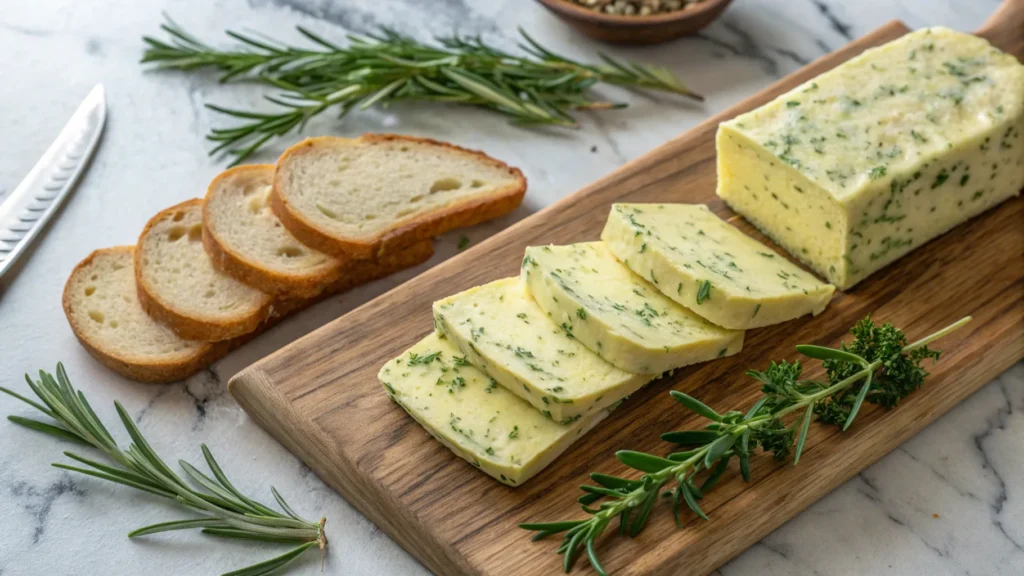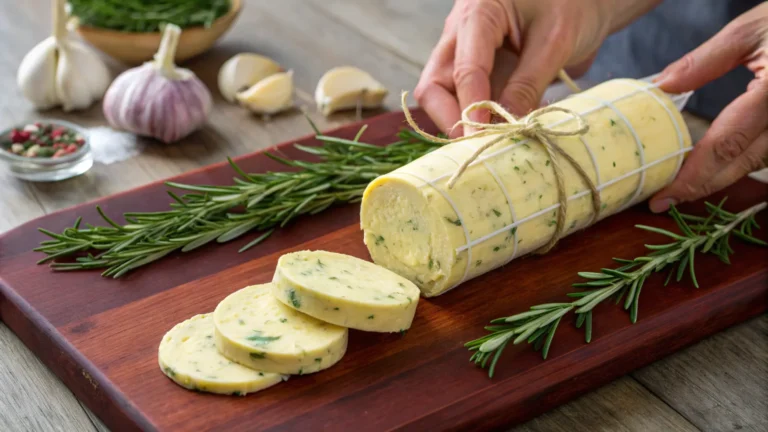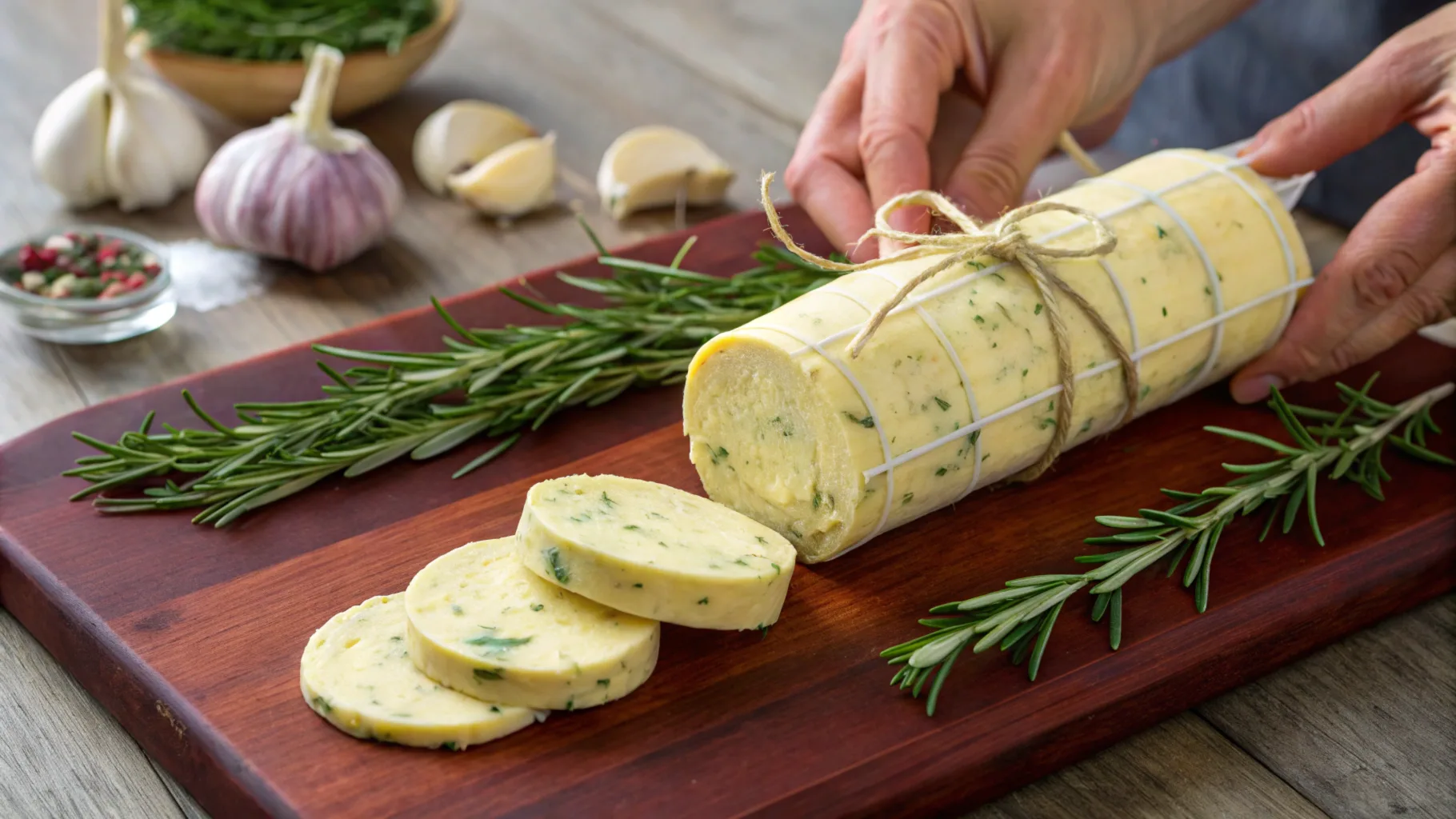Rosemary Thyme Compound Butter For Fish, When it comes to cooking fish, simple tricks often bring out the best flavors. And let’s face it, nobody wants bland, uninspired seafood. That’s where rosemary thyme compound butter comes in—a game-changer for your kitchen! Imagine a pat of herb-infused butter melting over a hot fillet, filling your kitchen with the warm aroma of fresh rosemary and thyme. Sounds delicious, right? In this article, we’ll walk you through everything you need to know about this delightful addition to your culinary arsenal. From its benefits to mouthwatering recipes, you’ll have all the tips and tricks to create fish dishes that wow every time. Let’s get started!
Table of Contents
Why Rosemary Thyme Butter for Fish is a Must-Try
The Versatility of Compound Butter
Compound butter might sound fancy, but it’s as easy as mixing softened butter with herbs and spices. What makes it so versatile? You can tweak the flavors to suit nearly anything—meats, veggies, or, in this case, fish! This buttery magic adds richness and moisture to seafood without overpowering its delicate flavor. Whether you’re grilling salmon, baking cod, or searing halibut, a dollop of this butter takes it to a whole new level. Plus, it’s quick—just slice off a piece, and you’re good to go. Convenience meets deliciousness, and honestly, who doesn’t love that?
The Aromatic Pairing of Rosemary and Thyme
Now, let’s talk herbs. Rosemary and thyme aren’t just kitchen staples—they’re a power couple in flavor. Rosemary has a woodsy, almost pine-like aroma that pairs beautifully with thyme’s mild earthiness. Together, they create a balance that works perfectly with fish, adding depth without overwhelming its natural taste. Oh, and if you’re worried about rosemary being too strong—don’t be! When blended into butter, it mellows out just enough, giving your fish the perfect herby kick.
How Compound Butter Enhances the Natural Flavors of Fish
Fish is like a blank canvas—it absorbs whatever flavors you throw at it. But let’s not throw too much, right? Herb compound butter adds just the right amount of seasoning while letting the fish’s natural taste shine. The butter itself melts into a rich sauce, soaking into the fish and creating a silky texture. Meanwhile, the rosemary and thyme infuse their aromatic notes, giving you that melt-in-your-mouth experience. Whether you’re hosting a dinner party or whipping up a quick weeknight meal, this combination is guaranteed to impress.
Building Interest: The Science Behind Compound Butter and Its Impact on Fish Dishes
What Makes Compound Butter Unique in Cooking?
Have you ever wondered why compound butter seems to make everything better? It’s all about how it melts! Butter is a fantastic carrier for flavors because it dissolves fat-soluble compounds from herbs like rosemary and thyme. This means their aromas and taste spread evenly across your dish. When you put rosemary thyme compound butter for fish on a steaming hot fillet, the butter melts instantly, creating a glossy sauce that clings to every bite. Plus, the fats in butter help keep the fish moist—a lifesaver if you’re prone to overcooking.
Beyond that, the butter acts like a flavor sponge. It locks in the herb oils and citrus zest you might add, giving your fish a burst of freshness and depth. The result? A meal that feels fancy but doesn’t take much effort. (And let’s be honest, we all want that, right?)
Rosemary and Thyme: A Flavor Profile Analysis
Let’s dig a little deeper into why rosemary and thyme work so well together. Rosemary is bold—some might even say it’s a bit “piney.” On its own, it can be overpowering, but when you add thyme, its softer, lemony notes balance out rosemary’s strength. This duo works especially well with fish because it complements the mildness without masking it. Think of them as co-stars—they’re great together, but they let the fish take the spotlight.
Oh, and here’s a fun tip: if you’re cooking a fattier fish like salmon, the rosemary cuts through the richness, while the thyme brings a fresh zing. For lighter fish like tilapia, these herbs add a touch of sophistication without making it too heavy. It’s the perfect balance!
Why Fish and Herbs Are a Match Made in Culinary Heaven
Fish and herbs are like peanut butter and jelly—they just belong together. But why? The answer lies in the delicate nature of fish. It needs something light and aromatic to enhance its flavor. Strong spices can overwhelm, but herbs like rosemary and thyme hit that sweet spot. When combined in a butter, the pairing becomes even better. The butter gently seasons the fish as it cooks, creating a tender, flavorful bite that feels almost gourmet.
And the best part? Rosemary thyme compound butter for fish doesn’t just taste amazing—it smells incredible too. That herbaceous aroma wafting from your oven or grill will make your kitchen feel like a five-star restaurant. Trust me, your family or guests will be asking for seconds!
Creating Desire: How to Make Rosemary Thyme Compound Butter
Simple Ingredients for a Gourmet Result
Making rosemary thyme compound butter for fish is one of those things that’s so easy, you’ll wonder why you haven’t been doing it all along. Here’s what you need:
- Unsalted butter (room temperature)
- Fresh rosemary (chopped finely)
- Fresh thyme (leaves stripped from stems)
- Lemon zest
- Garlic (optional, but so worth it)
- A pinch of salt and pepper
That’s it! You don’t need anything fancy—just good-quality ingredients that work together like magic. Fresh herbs are a must, though, so skip the dried stuff unless you’re in a pinch.
Step-by-Step Guide to Making the Perfect Compound Butter
- Start by softening your butter. Leave it out at room temperature until it’s pliable—don’t microwave it, or you’ll end up with a greasy mess.
- Finely chop your rosemary and thyme. The finer, the better. Trust me, you don’t want big chunks of herbs in your butter.
- Zest a lemon and, if you’re using it, mince a clove of garlic.
- In a bowl, mix the butter, herbs, lemon zest, garlic, salt, and pepper. Use a fork to mash everything together until it’s evenly combined.
- Scoop the butter onto a sheet of parchment paper, roll it into a log, and twist the ends. Pop it in the fridge to firm up.
That’s it! You now have a delicious butter that’s perfect for fish—or really, anything.
Customizing Your Butter for Different Types of Fish
Here’s where you can get creative. While the classic rosemary thyme compound butter for fish is perfect as is, you can tweak it based on what you’re cooking. Add a dash of smoked paprika if you’re grilling salmon, or toss in some dill if you’re baking cod. For shrimp or scallops, try swapping the lemon zest for lime for a citrusy twist.
If you’re feeling adventurous, you can even mix in a bit of Parmesan or a drizzle of honey for something unexpected. Just remember, the butter should complement the fish, not steal the show.
Inspiring Action: Recipes and Serving Ideas with Rosemary Thyme Compound Butter
Classic Grilled Salmon with Herb Butter
Grilled salmon is a staple, but when you add a dollop of rosemary thyme compound butter for fish, it becomes extraordinary. Start by seasoning the salmon with salt, pepper, and a splash of olive oil. Grill the fillet skin-side down until it’s almost cooked through, then flip for the last few minutes. When it’s hot off the grill, top it with a slice of your compound butter and watch it melt into a rich, herby sauce.
This is a crowd-pleaser for summer BBQs or even a quick weeknight dinner. Serve it with a side of roasted asparagus or garlic mashed potatoes. For more salmon-related tips, you might enjoy this guide to cooking salmon from frozen.
Herb-Crusted Tilapia with a Butter Finish

Tilapia is a blank slate, which makes it perfect for showcasing rosemary thyme compound butter. Coat the fish in a mixture of breadcrumbs, Parmesan, and a bit of garlic powder before baking it at 400°F for 10-12 minutes. Once it’s golden and crispy, let your compound butter do the rest. It seeps into the breadcrumbs, creating a moist and flavorful bite.
Pair this dish with lemon rice or a fresh garden salad. If you’re looking for more seafood recipes, check out this seafood guide.
Elevating Shellfish with Rosemary Thyme Butter

Shrimp, scallops, or even lobster tails love a little herb butter action. Sear shrimp or scallops in a hot pan until golden, then toss in a tablespoon of rosemary thyme compound butter for fish. It creates a luscious sauce that coats the shellfish beautifully. For lobster tails, brush the butter over the meat before broiling for a rich and luxurious flavor.
Want to take it up a notch? Add a squeeze of lemon and a pinch of red pepper flakes for a spicy kick. For more inspiration, don’t miss our other seafood tips!
FAQs:
Can I Use Dried Herbs Instead of Fresh?
Absolutely! While fresh rosemary and thyme provide the best flavor, dried herbs work in a pinch. Use about half the amount of dried herbs as fresh, since they’re more concentrated. Just make sure to crumble the dried herbs between your fingers to release their oils before mixing them into your butter.
How Long Does Compound Butter Last?
Stored properly, compound butter can last up to two weeks in the refrigerator or three months in the freezer. Wrap it tightly in parchment paper and then in plastic wrap to keep it fresh. Slice off only what you need and keep the rest chilled. Pro tip: freeze individual slices for easy use!
What Other Herbs Pair Well with Fish?
If you’re feeling adventurous, try experimenting with dill, parsley, or tarragon. These herbs blend beautifully with butter and pair nicely with fish. You can even mix and match them with rosemary and thyme for a custom flavor. For even more ideas, check out our creative tips for seasoning fish.
Conclusion:
Cooking doesn’t have to be complicated, and rosemary thyme compound butter for fish is living proof of that. This simple yet flavorful addition can transform any fish dish into something extraordinary. Whether you’re grilling salmon, baking tilapia, or sautéing shrimp, this herb-infused butter melts perfectly into your seafood, enhancing every bite with its rich, aromatic goodness.
What makes this butter so special? It’s versatile, quick to make, and packed with fresh flavors. Plus, it’s freezer-friendly, so you can always have it on hand for last-minute dinners. And let’s be real—there’s nothing better than hearing compliments from family or friends who think you spent hours perfecting your meal when, in reality, it was as easy as slicing butter.
Remember, the magic of this butter isn’t just in the taste; it’s in the experience. The herbaceous aroma of rosemary and thyme wafting through your kitchen, the buttery richness soaking into tender fish—it’s all about creating those moments where food feels like love on a plate.
So, the next time you’re in the mood for seafood, skip the plain butter and make it special with this recipe. Rosemary thyme compound butter is your secret weapon for dishes that are not only easy but unforgettable. Why not give it a try tonight?
Chicken Alfredo Recipe With Jar Sauce
Facebook Eminent Recipes

Rosemary Thyme Compound Butter for Fish
Rosemary Thyme Compound Butter is a simple, flavorful addition to fish dishes, combining creamy butter, fresh herbs, and zesty lemon for a gourmet finishing touch.
- Total Time: 1 hr 10 min
Ingredients
- 1/2 cup unsalted butter, softened
- 1 tsp fresh rosemary, finely chopped
- 1 tsp fresh thyme, finely chopped
- 1 clove garlic, minced
- 1/2 tsp lemon zest
- Salt and pepper to taste
Instructions
- Prepare the Butter: In a small bowl, combine softened butter, rosemary, thyme, garlic, lemon zest, salt, and pepper. Mix until well combined.
- Shape the Butter: Place the butter mixture on a piece of parchment paper or plastic wrap. Roll into a log shape and twist the ends to seal.
- Chill: Refrigerate for at least 1 hour, or until firm.
- Use with Fish: Slice into rounds and place on top of cooked fish, such as salmon, cod, or trout, to melt and infuse flavor.
Notes
- Room Temperature Butter: Ensure the butter is soft enough to mix easily with the herbs but not melted.
- Freezing Tip: Store the compound butter in the freezer for up to 3 months and slice as needed.
- Herb Variations: Substitute parsley, dill, or chives for a different flavor profile.
- Make It Ahead: Prepare in advance for quick and effortless seasoning on busy cooking days.
- Serving Ideas: Use on grilled, baked, or pan-seared fish. It also works beautifully on vegetables or crusty bread.
- Prep Time: 10 mins
- Cook Time: 1 hour

